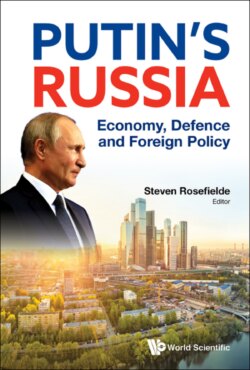Читать книгу Putin's Russia - Группа авторов - Страница 10
На сайте Литреса книга снята с продажи.
Chapter 1 Putin’s Muscovite Economy
ОглавлениеSteven Rosefielde
Russia’s economy is an imperfectly competitive market system with Muscovite characteristics (Clark, 1940). The demand and supply of factors, finance, production and distribution are significantly, but not completely, governed by competitive market forces. Private individuals and institutions own most of Russia’s productive assets on a freehold basis, but the state holds title to the military industrial complex (MIC) and natural resources in the people’s name. Large firms (oligopolies) exert market power, supported by state policy and the judiciary. The rule of contract law assists privileged insiders. Rent-seeking (lucrative state contracting with privileged insiders) and rent-granting are endemic. Criminal influences are strong and the “mafia” operates in collusion with the Federal Security Service [Federal’naya sluzhba bezopasnosti Rossiyskoy Federatsii (FSB)]. The state allows loyal insiders to steal public assets (kleptocracy) (Aslund, 2019a, 2019b; Dawisha, 2014). Entrepreneurship is legal; however, it is restrained by predatory political risks.
Russian producers under these conditions cannot competitively maximise profit, and individuals are unable to maximise consumer utility. The distribution of income is inequitable. Workers are underpaid, and powerful individuals accumulate immense unearned wealth. These imperfections are not unique. Most market systems are inefficient; however, Russia’s market deficiencies are especially strong, exceeding those endemic in America, the European Union and China (Rosefielde and Leightner, 2017).
Anti-competitiveness impedes economic growth by hampering consumer-driven technological progress and entrepreneurship, while State controls allow Kremlin leaders to maintain huge military forces in accordance with Muscovite precedent (Rosefielde and Mills, 2020). Ivan the Terrible, Grand Prince of Muscovy from 1533 to 1547 and Tsar of All Rus’ until his death in 1584, devised an economic system to serve his great power autocratic aspirations. He claimed freehold ownership of the means of production, including the peasantry, allowing the nobles acting as his agent-servitors to run the economy on assets that Ivan “rented” to them in return for a share of the crop, fealty and military and government service. He dispensed with markets, unconcerned about productive efficiency and consumer satisfaction. His patrimonial “rent-granting” economic scheme fostered affluence for himself and his loyal supporters, military might for his conquests, gradual military-intensive economic development and the perpetuation of his political authority (Rosefielde and Hedlund, 2008).
Putin’s contemporary Russian economy is more sophisticated than Ivan Grozny’s, but similarly patrimonial. Putin is the system’s de facto sovereign. Everyone else is his agent-servitor or tool. He not only rationally chooses to support and harness markets to enhance Russia’s economic might but also uses market controls and market rigging to build personal wealth, buy the loyalty of his supporters, maintain powerful armed forces for diverse purposes, foster economic modernisation and perpetuate his political authority. Western markets promote consumer sovereignty, that is, consumer control of the private sector through the purse and democratic control over the public sector via the ballot. Russia’s economy principally serves Putin’s autocrat power agenda. This is why Russia is an imperfectly competitive market system with Muscovite characteristics.
